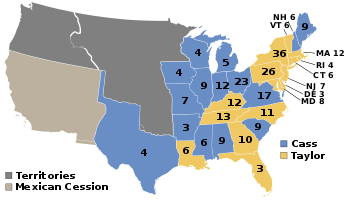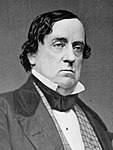Our website is made possible by displaying online advertisements to our visitors.
Please consider supporting us by disabling your ad blocker.
1848 United States presidential election
| |||||||||||||||||||||||||||||||||||||||||
290 members of the Electoral College 146 electoral votes needed to win | |||||||||||||||||||||||||||||||||||||||||
|---|---|---|---|---|---|---|---|---|---|---|---|---|---|---|---|---|---|---|---|---|---|---|---|---|---|---|---|---|---|---|---|---|---|---|---|---|---|---|---|---|---|
| Turnout | 72.8%[1] | ||||||||||||||||||||||||||||||||||||||||
| |||||||||||||||||||||||||||||||||||||||||
 Presidential election results map. Yellow denotes states won by Taylor/Fillmore and Blue by Cass/Butler. Numbers indicate the number of electoral votes cast by each state. | |||||||||||||||||||||||||||||||||||||||||
| |||||||||||||||||||||||||||||||||||||||||
Presidential elections were held in the United States on November 7, 1848. Held in the aftermath of the Mexican–American War, General Zachary Taylor of the Whig Party defeated Senator Lewis Cass of the Democratic Party.[2]
Despite Taylor's unclear political affiliations and beliefs, and the Whig opposition to the Mexican–American War, the 1848 Whig National Convention nominated the popular general over party stalwarts such as Henry Clay and Daniel Webster. For vice president, the Whigs nominated Millard Fillmore, a New York Whig known for his moderate views on slavery. Incumbent President James K. Polk, a Democrat, honored his promise not to seek re-election, leaving his party's nomination open. The 1848 Democratic National Convention nominated Senator Lewis Cass of Michigan after former President Martin Van Buren withdrew his bid for a second term over a platform dispute. Van Buren broke from his party to lead the ticket of the Free Soil Party, which opposed the extension of slavery into the territories.
The Whig choice of Zachary Taylor was made almost out of desperation; he was not clearly committed to Whig principles, but he was popular for leading the war effort. The Democrats had a record of prosperity and had acquired the Mexican cession and parts of Oregon country. It appeared almost certain that they would win unless the Whigs picked Taylor. Taylor won a plurality of the popular vote and a majority of the electoral vote, while Van Buren won 10.1% of the popular vote, a strong showing for a third party candidate.
Taylor's victory made him the second and final Whig to win a presidential election, following William Henry Harrison's victory in the 1840 presidential election. Like Harrison, Taylor died during his term, and he was succeeded by Fillmore. Taylor was the last president elected from the Deep South until Jimmy Carter in 1976.
- ^ "National General Election VEP Turnout Rates, 1789-Present". United States Election Project. CQ Press.
- ^ Allan Nevins, Ordeal of the Union: Volume I. Fruits of Manifest Destiny, 1847–1852 (1947).
Previous Page Next Page
انتخابات الرئاسة الأمريكية 1848 Arabic ھەڵبژاردنی سەرۆکایەتیی ویلایەتە یەکگرتووەکانی ئەمریکا (١٨٤٨) CKB Præsidentvalget i USA 1848 Danish Präsidentschaftswahl in den Vereinigten Staaten 1848 German Elecciones presidenciales de Estados Unidos de 1848 Spanish Yhdysvaltain presidentinvaalit 1848 Finnish Élection présidentielle américaine de 1848 French הבחירות לנשיאות ארצות הברית 1848 HE Elezioni presidenziali negli Stati Uniti d'America del 1848 Italian 1848年アメリカ合衆国大統領選挙 Japanese





